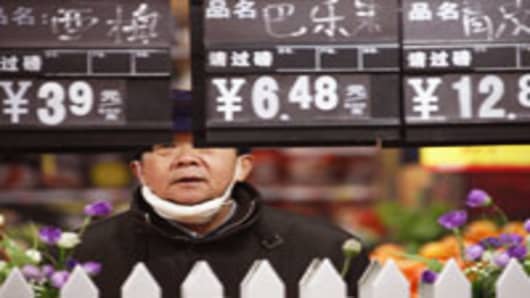China's annual consumer inflation rate accelerated to a seven-month high of 2.5 percent in December on rising food prices, ahead of expectations and narrowing the scope for the central bank to boost the economy by easing monetary policy.
But analysts say that although price pressures will quicken in coming months, due to low year-ago comparison figures, they will stay benign overall this year - meaning the central bank could still afford to loosen policy if economic growth crumbles.
"The CPI data is mainly driven by rising food prices due to seasonal factors and the recent cold weather," said Li Huiyong, an economist at Shenyin & Wanguo Securities in Shanghai. "We expect consumer inflation would not be a big concern for the government in 2013, with an annual increase of 3 percent."
For the year, China's consumer inflation accelerated 2.6 percent to stand comfortably below the central bank's 4 percent target.
Food, estimated to account for around 30 percent of China's consumer price index, was a key driver of inflation last month as cold weather and holiday demand raised prices. The National Bureau of Statistics said the food CPI rose 4.2 percent year-on-year in December. The non-food component rose 1.7 percent.
Accelerating inflation underlines hopes that the world's second-biggest economy is emerging from its worst downturn in more than three years in a gradual recovery led by strengthening domestic demand.
The China Securities Journal quoted Zhang Xiaoqiang, vice head of the National Development and Reform Commission, China's top planning agency, as saying last week that China's consumer inflation would run at 3.5 percent in 2013.
Factory Gate Deflation Easing
In a sign that things may be looking up for China's corporate sector, which has been battling falling profits, Friday's data pointed to easing producer deflation.
The producer price index fell 1.9 percent in December from a year ago in the 10th consecutive month of decline, but improving from November's 2.2 percent annual fall. Economists had forecast a 1.8 percent decline.
Data on Thursday showed China's export growth rebounding surprisingly sharply to a seven-month high in December in a strong finish to the year after seven straight quarters of slowdown, even though subdued foreign demand means the revival may not be sustained.
The risk that China's tentative economic rebound could falter if growth swoons in Europe and the United States - its two biggest export markets - means Beijing would be ready to loosen policy in the face of a sharp slowdown, analysts say.
Any easing, however, would be done by reducing banks' reserve requirements rather than interest rates to avoid further fanning already-rebounding property prices, they predict.
After cutting interest rates twice between June and July last year, China has abstained from further cuts despite widespread market calls for looser policy.
It has also refrained from lowering banks' reserve requirements (RRR) since May 2012, when it cut the ratio of cash it requires lenders to hold as reserves by 50 basis points to 20 percent for China's biggest banks.


